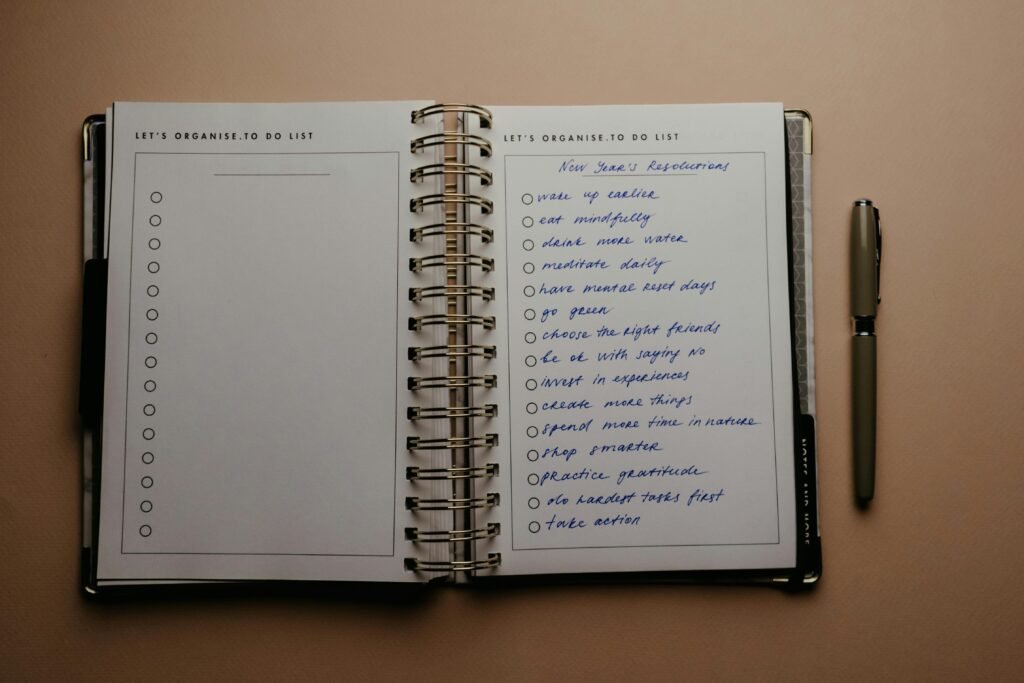
Understanding Self-Improvement
Self-improvement is all about getting better in different areas of life.
For young adults, it’s a chance to develop new skills, build better habits, and grow into more capable and confident individuals.
It’s not something that happens overnight; it’s more of a continuous journey that involves making small, consistent changes. Think of it like upgrading your personal software.
The first thing to know is that self-improvement is personal. What works for one person might not work for another.
It’s important to figure out what areas you want to improve in—whether it’s health, career, relationships, or personal happiness.
Once you identify these areas, you can start taking steps to make positive changes.
Another key part of self-improvement is mindset.
Having a growth mindset means believing that you can improve and develop through effort and learning.
It’s about being open to new experiences, willing to learn from mistakes, and staying persistent even when things get tough.
This mindset can help you push through challenges and stay motivated on your journey.
Self-improvement also involves setting clear, achievable goals.
By breaking down big dreams into smaller, manageable tasks, you can make progress without feeling overwhelmed.
It’s helpful to write down your goals and keep track of your progress.
This not only keeps you focused but also gives you a sense of accomplishment as you tick off each milestone.
Another aspect to consider is the environment you’re in.
Surround yourself with people who support your growth and challenge you to be better.
Whether it’s friends, mentors, or even online communities, having a positive and encouraging environment can make a huge difference.
Lastly, remember to be patient with yourself.
Growth takes time and effort. There will be ups and downs, but what matters is staying committed to the process.
Celebrate your successes, learn from your failures, and keep moving forward.
Self-improvement is a lifelong journey, and every step you take brings you closer to becoming the best version of yourself.
Setting Clear Goals

Setting clear goals is super important for self-improvement.
Goals give you direction and keep you focused on what you want to achieve.
When you’re clear about your goals, you know exactly where to put your energy and time.
Start by distinguishing between short-term and long-term goals.
Short-term goals are like the smaller steps that lead to your bigger dreams.
For example, if your long-term goal is to land your dream job, a short-term goal could be to finish a relevant course or update your resume.
These smaller goals make the bigger ones feel more achievable and less overwhelming.
When setting your goals, make sure they’re specific and measurable.
Instead of saying, “I want to be healthier,” say, “I want to go to the gym three times a week.”
This way, you have a clear target to aim for.
Writing down your goals also makes a big difference.
It turns them from ideas into something more concrete.
Plus, seeing them in black and white can keep you motivated.
Don’t forget to regularly review your goals. Life changes, and sometimes your priorities shift.
Checking in on your goals helps you stay on track and adjust them if needed.
Maybe you’ve achieved a short-term goal faster than expected, or maybe a long-term goal needs tweaking.
Regular reviews keep everything aligned with your current situation.
Another key aspect is breaking down big goals into smaller tasks.
If your goal is to write a book, don’t just focus on the end result.
Break it down into chapters or even daily word counts. Smaller tasks make the big goal feel more manageable and less intimidating.
Accountability can also be a game-changer. Share your goals with a friend or join a group of like-minded people.
Having someone to check in with can boost your motivation and keep you accountable.
It’s harder to skip the gym if you know a friend is waiting for you.
Lastly, celebrate your wins, no matter how small.
Achieving a goal, even a minor one, deserves recognition.
It boosts your confidence and keeps you motivated to tackle the next one.
So go ahead, pat yourself on the back when you hit a milestone. It’s all part of the journey.
Developing Healthy Habits

Healthy habits are a game-changer for anyone looking to improve themselves.
For young adults, forming good habits now sets the stage for a better future.
It’s not just about hitting the gym or eating your veggies—though those are super important—it’s about creating a balanced lifestyle that keeps you in top shape mentally and physically.
First up, let’s talk exercise.
Regular physical activity boosts your mood, energy levels, and overall health.
You don’t have to become a gym rat; even a 30-minute walk or a quick home workout can make a big difference.
Find something you enjoy, whether it’s dancing, swimming, or hiking, and make it a part of your routine.
Consistency is key.
Eating well is another crucial habit.
A balanced diet fuels your body and mind.
Think more fruits, veggies, lean proteins, and whole grains.
It’s okay to indulge in your favorite treats occasionally, but try to make healthier choices most of the time.
Planning meals ahead can help you avoid the temptation of fast food and make sure you’re getting the nutrients you need.
Sleep often gets overlooked, but it’s just as important as diet and exercise.
Aim for 7-9 hours of quality sleep each night.
Good sleep habits include sticking to a regular sleep schedule, avoiding screens before bed, and creating a calming bedtime routine.
When you’re well-rested, you’re more focused, productive, and in a better mood.
Let’s not forget mental health. Incorporate activities that reduce stress and boost your mental well-being.
This could be anything from meditation and yoga to journaling and spending time in nature.
to avoid engaging in violent behavior and stay on a positive path.
Taking care of your mind is just as important as taking care of your body.
Another tip is to stay hydrated. Drinking enough water keeps your body running smoothly.
Carry a water bottle with you and take sips throughout the day. It’s a small habit that can have big benefits.
Cutting down on harmful habits is also part of the equation.
Try to limit alcohol, quit smoking, and avoid risky behaviors.
These changes can dramatically improve your quality of life and set you on a healthier path.
Incorporating these healthy habits into your daily routine might seem challenging at first, but start small.
Enhancing Time Management Skills

Time management is a real game-changer for self-improvement.
It’s all about making the most of your 24 hours, so you can hit your goals without burning out.
First things first, get yourself a planner or use a digital calendar.
Jot down all your tasks, appointments, and deadlines. It helps to see everything laid out in front of you, making it easier to plan your day.
One tip is to break your tasks into smaller, more manageable chunks.
Big projects can feel overwhelming, but splitting them into bite-sized pieces makes them way less daunting.
For example, if you have a research paper due, break it down into sections like research, outline, draft, and revision.
Tackling one section at a time can keep you focused and productive.
Prioritizing tasks is another must-do. Not all tasks are created equal.
Figure out what needs to be done first based on urgency and importance.
The Eisenhower Matrix can help with this.
It’s a tool that categorizes tasks into four quadrants: urgent and important, important but not urgent, urgent but not important, and neither.
Spend most of your time on the important stuff, and don’t let the less critical tasks steal your focus.
Speaking of focus, try to limit distractions.
We’re all guilty of falling down the social media rabbit hole, but those distractions can seriously eat into your productive time.
Consider using apps that block social media or set your phone to “Do Not Disturb” mode when working on important tasks.
Creating a dedicated workspace, free from distractions, can also help you stay in the zone.
Another trick is the Pomodoro Technique. Work for 25 minutes, then take a 5-minute break.
After four cycles, take a longer break. This method keeps your mind fresh and helps maintain focus.
It’s amazing how much you can get done when you know a break is just around the corner.
Don’t forget to factor in some buffer time. Life is unpredictable, and things don’t always go as planned.
Having a little extra time between tasks can prevent your schedule from going off the rails if something unexpected pops up.
Finally, learn to say no.
It’s tempting to say yes to every opportunity, but overcommitting can stretch you thin.
Be selective with your commitments and make sure they align with your goals.
It’s better to do a few things well than to juggle too many and end up dropping the ball.
Improving Communication Skills

Communication skills are super important for growing both personally and professionally.
Expressing yourself clearly and understanding others can totally boost your relationships and career chances.
So how do you get better at this?
Start with active listening.
This means really paying attention when someone is talking, instead of just waiting for your turn to speak.
Nod, make eye contact, and even repeat back what you’ve heard to show you’re engaged.
People appreciate it when they know you’re really listening.
Next, let’s talk about body language.
Sometimes what you don’t say speaks louder than words.
Pay attention to your posture, gestures, and facial expressions.
They should match the message you’re trying to send.
For example, if you’re giving a compliment, smile and make eye contact to show you mean it.
Also, work on being clear and concise.
Whether you’re writing an email or talking to someone face-to-face, get to the point.
Rambling can confuse your listener and make it hard for them to follow along.
Think about what you want to say and stick to the main points.
Another key aspect is asking questions.
This not only shows you’re interested but also helps you understand the other person better.
Don’t just ask yes or no questions; go for open-ended ones that require a more detailed response.
It keeps the conversation flowing and makes it more engaging.
Remember, tone matters too. How you say something can be just as important as what you say.
A friendly, positive tone can make a huge difference, especially when discussing something important or sensitive.
Sometimes, it’s also about knowing when to speak up and when to listen.
Balancing talking and listening can make interactions smoother and more productive.
If you’re dominating the conversation, take a step back and give others a chance to share their thoughts.
Lastly, practice makes perfect. The more you communicate, the better you’ll get at it.
Don’t be afraid to put yourself out there, whether it’s joining a club, participating in group projects, or just striking up a conversation with a new person.
Improving your communication skills can open up a lot of doors and make you feel more connected to the people around you.
Building Emotional Intelligence

Emotional intelligence is all about understanding and managing your own emotions and those of others.
It’s a key part of growing and improving yourself.
Being emotionally intelligent helps you navigate life’s ups and downs and build better relationships.
One of the first steps to building emotional intelligence is practicing self-reflection.
Take a moment each day to think about how you feel and why.
This can help you identify patterns in your emotions and understand what triggers them.
Keeping a journal can be a great way to track your feelings and see your progress over time.
Empathy is another biggie.
Put yourself in someone else’s shoes and try to see things from their perspective.
This doesn’t mean you have to agree with them, but understanding where they’re coming from can make interactions smoother and more meaningful.
Listening actively, as mentioned in the communication section, plays a huge role here.
Really hearing someone out without jumping to conclusions shows that you value their feelings.
Emotional self-regulation is crucial too.
It’s all about managing your reactions to different situations.
When something ticks you off, take a deep breath before responding.
This pause can give you a moment to think and react more calmly.
Successful young adults show this skill, which allows them to adapt flexibly to life’s opportunities and challenges with reasonable emotional self-control.
Another way to boost your emotional intelligence is by being more aware of your body language and non-verbal cues.
Sometimes your body says more than your words.
Being mindful of your gestures and expressions can help you convey your feelings more accurately and understand others better.
Developing resilience also ties into emotional intelligence.
Life isn’t always a smooth ride, and being able to bounce back from setbacks is key.
Practice seeing challenges as opportunities to learn and grow, rather than roadblocks.
This shift in perspective can make a huge difference in how you handle tough times.
Finally, don’t shy away from seeking feedback.
Ask friends or mentors how you come across in different situations.
Their insights can provide valuable perspectives that you might not have considered.
Continuously Learning and Adapting

Staying curious and always learning is key to self-improvement.
For young adults, keeping an open mind and adapting to new experiences can make a huge difference.
It’s not just about formal education—learning can happen anywhere and anytime.
Dive into books, online courses, or even podcasts that interest you.
This kind of ongoing learning helps you stay sharp and ready for whatever comes your way.
Successful people often show qualities like integrity, responsibility, and honesty.
These traits are built through continuous learning and growth.
By being ethical, trustworthy, and helpful, as well as complying with common social norms and adult rules of conduct, you can build a solid reputation and strong relationships.
Trying new activities is another great way to learn and adapt.
Whether it’s picking up a new hobby or traveling to a new place, these experiences broaden your horizons and teach you valuable lessons.
Don’t be afraid to step out of your comfort zone.
New experiences can be intimidating, but they’re also incredibly rewarding.
Adapting to change is a crucial skill.
Life is full of unexpected twists and turns, and being able to roll with the punches can make all the difference.
This might mean adjusting your plans or finding new ways to tackle problems.
Flexibility and a positive attitude can help you navigate changes more smoothly.
Networking is also a form of learning. Connecting with people from different backgrounds and industries can offer new insights and opportunities.
Attend events, join online forums, or simply strike up conversations with new people.
These interactions can provide fresh perspectives and valuable advice.
Remember, learning isn’t just about gaining knowledge; it’s also about applying what you’ve learned.
Put your new skills and insights into practice.
Whether it’s in your job, personal life, or hobbies, real-world application helps solidify your learning and makes it more meaningful.
Lastly, stay humble and open to feedback.
No one knows everything, and there’s always room for improvement.
Seeking feedback from others can highlight areas where you can grow and improve.
It’s all part of the journey to becoming the best version of yourself.
Keep learning, keep adapting, and watch yourself thrive.
